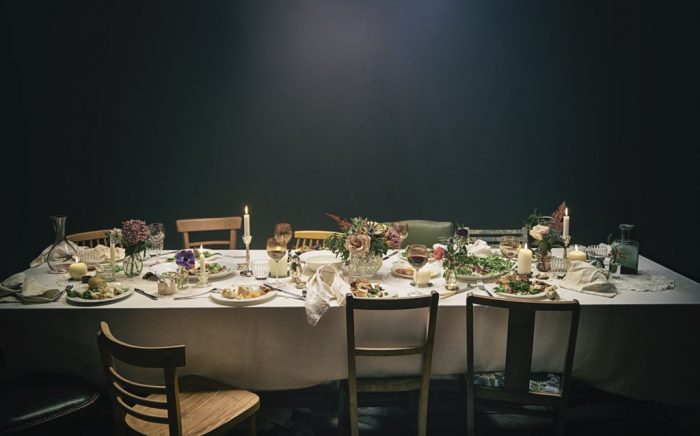This Thanksgiving, let’s break bread — and break the silence on mental health

Republished from Kentucky Lantern

Thanksgiving is nearly here, a time when many of us will gather with loved ones to share a meal and reflect on the year. For many of us, however, this season, this year, has the potential to stir up tension.
The recent election has heightened existing divides, and for some, irrespective of political affiliation, the thought of being at the same table with relatives who hold different political views may evoke palpable anxiety. During a time that is supposed to cultivate togetherness, many people actually may feel more isolated.
Thanksgiving-related stress, as a concept, is nothing new. It can result from a variety of sources unrelated to politics. Financial strain, family dynamics, travel plans and preparing to host wanted guests can make it difficult to feel thankful at every moment.
But this year, circumstances are poised to heighten this anxiety. For example, evidence from the American Psychological Association demonstrates that, among American adults, election-related stress was more pronounced in 2024 than in either 2020 or 2016.
So, even as Thanksgiving serves as a time for gratitude, it also should be a time of nonpartisan recognition: Mental health struggles do not adhere to party lines, and isolation can have devastating effects. Most importantly, our loved ones, colleagues, friends or neighbors, for a variety of reasons, may be quietly struggling.
As researchers at the University of Kentucky, our careers are dedicated to helping advance the commonwealth. Often, the most meaningful outcomes emerge when we work both in and with communities. For this reason, we are calling for a community conversation about mental health in Kentucky, particularly during this time of intensified stress and potential isolation.
This conversation is necessary, particularly when you consider the following facts.
In Kentucky, suicide represents the second leading cause of death for people aged 10-34. Over the past seven years, more than 5,300 Kentuckians — an average of 800 each year — have died by suicide.
Each life lost represents not only an individual tragedy but a ripple effect of grief and trauma for families, friends and entire communities. Research shows that every suicide directly impacts about 135 people, meaning hundreds of thousands of Kentuckians have felt the impact of this crisis over the past several years.
These numbers tell a story of need. People in our communities need support, understanding, hope, and, above all, meaningful action.
What might that action look like? It begins with learning how to recognize the signs of mental distress and understanding how to initiate a conversation with someone who you believe may have lost hope.
UK HealthCare is offering a free, online resource that can empower every Kentuckian to take this action.
It’s called Question, Persuade, and Refer (QPR) training. This short, effective program teaches skills to recognize someone in distress, engage them in conversation, and connect them to resources. Much like CPR for physical crises, QPR offers a simple, practical approach to address mental health emergencies. Available online at no cost, QPR training enables each of us to be part of the solution, empowering everyday Kentuckians to support one another.
You can access this training at ukhealthcare.com/qpr.
Our hope is that this training — and this community conversation — may help address the stubborn stigma associated with mental health in America.
Mental health stigma prevents many people from seeking help; it can be particularly powerful when feelings of distress are amplified by the pressure to “keep the peace” around the holidays. However, this may be a time when expressing concern and empathy may make the biggest difference.
We often hear that individuals feel uncomfortable broaching the topic of depression or suicide, fearing that asking if another person is struggling or even considering suicide may create or increase suicidal thoughts. We have no evidence that suggests talking about suicide “puts the idea in someone’s head.” In fact, particularly during difficult times, an expression of concern can be a lifeline, offering connection and support when someone may feel most alone.
QPR equips us with the right questions to ask, and the right words to say, to break through isolation.
In addition to QPR, resources like the 988 Suicide & Crisis Lifeline offer 24/7 support for anyone in need, connecting callers with trained professionals who can offer immediate help. But emergency hotlines are just one part of the solution; the core of preventing suicide lies in building a culture of compassion and connection. When each of us makes the effort to become informed, to reach out, and to support one another, we collectively create a stronger, safer Kentucky.
Of course, we hope Thanksgiving will bring warmth and respite to all of our fellow Kentuckians. However, the weight of unresolved tensions and personal struggles for some of our community members will make this season difficult. Rather than shying away from these realities, we can embrace this opportunity to make a difference.
Taking the QPR training is a simple step, yet it embodies a deep commitment to building a supportive and resilient community. By having this conversation and recognizing when our actions may save lives, we can create something truly worth celebrating. This Thanksgiving, let’s be grateful not only for the blessings we enjoy but for the opportunity to uplift those who need us most.
Kentucky Lantern is part of States Newsroom, a network of news bureaus supported by grants and a coalition of donors as a 501c(3) public charity. Kentucky Lantern maintains editorial independence. Contact Editor Jamie Lucke for questions: info@kentuckylantern.com. Follow Kentucky Lantern on Facebook and Twitter. Kentucky Lantern stories may be republished online or in print under Creative Commons license CC BY-NC-ND 4.0.
Donate to Kentucky Lantern here.